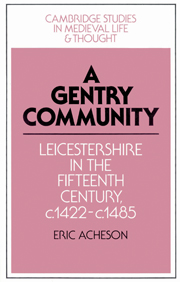Book contents
- Frontmatter
- Contents
- List of maps
- Acknowledgements
- Abbreviations
- Introduction
- 1 Leicestershire: the county, the Church, the crown and the nobility
- 2 The gentry in the fifteenth century
- 3 Land and income
- 4 A county community and the politics of the shire
- 5 The gentry and local government, 1422–1485
- 6 Household, family and marriage
- 7 Life and death
- Conclusion
- Appendices
- 1 The Leicestershire gentry, income and office holding, 1422–1485
- 2 Genealogies
- 3 Biographical notes on Leicestershire's leading gentry families (knights, distrainees and esquires)
- Bibliography
- Index
- Titles in the series
3 - Biographical notes on Leicestershire's leading gentry families (knights, distrainees and esquires)
Published online by Cambridge University Press: 27 October 2009
- Frontmatter
- Contents
- List of maps
- Acknowledgements
- Abbreviations
- Introduction
- 1 Leicestershire: the county, the Church, the crown and the nobility
- 2 The gentry in the fifteenth century
- 3 Land and income
- 4 A county community and the politics of the shire
- 5 The gentry and local government, 1422–1485
- 6 Household, family and marriage
- 7 Life and death
- Conclusion
- Appendices
- 1 The Leicestershire gentry, income and office holding, 1422–1485
- 2 Genealogies
- 3 Biographical notes on Leicestershire's leading gentry families (knights, distrainees and esquires)
- Bibliography
- Index
- Titles in the series
Summary
ACTON
Richard Acton was elected coroner sometime before 24 November 1430. On that date, and again on 3 August 1433, the king ordered his removal from office on the grounds that he was insufficiently qualified (C.C.R., 1429–35, pp. 75, 216). On both occasions he was referred to as ‘of Merston’, i.e. Potters Marston. Despite his alleged ‘insufficiency’, Richard was assessed for the tax of 1436 on an income of £9 per annum and, as witness to a deed of gift in 1437, he is referred to as ‘esquire’ (E179/192/59; L.R.O. 44′88/187). The king's orders for his removal from office notwithstanding, Acton was still performing coronial duties in 1442 (KB9/241/84). In the same year, he was appointed to deliver the gaol of Leicester (C.P.R., 1441–6, p. 79). The small manor of Potters Marston was held of the Benedictine priory of St Mary in Coventry which was in the habit of leasing out the manor house and demesne to farmers (T.L.A.S., 14, 1921–2, pp. 169–71). Given the overlord's links with Coventry, it is probable that Richard Acton of Potters Marston was either the son of Richard Acton, alderman of Coventry in 1423, or, perhaps, the same man (Coventry Leet Book, p. 44).
ADYNGTON (ALYNGTON)
In 1412, Thomas Adyngton, esquire, was reported as holding lands worth £4 per annum in Northamptonshire and ‘much’ in Leicestershire (Feudal Aids, vi, p. 498). He was taxed in Leicestershire in 1436 on an income of £20 (E179/192/59).
- Type
- Chapter
- Information
- A Gentry CommunityLeicestershire in the Fifteenth Century, c.1422–c.1485, pp. 215 - 258Publisher: Cambridge University PressPrint publication year: 1992



